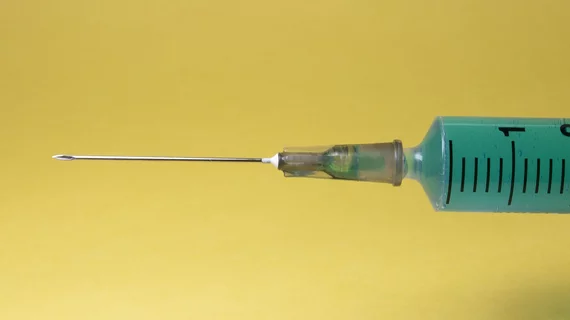Shoulder injury related to vaccine administration: How the latest MRI data describe the condition
A new paper in Skeletal Radiology details several common findings experts identified in patients with shoulder injuries related to vaccine administration (SIRVA).
SIRVA is a rare occurrence—emerging in less than 1% of vaccine administrations—that can manifest following misadministration of a routine vaccination, such as influenza, tetanus, COVID, etc. It is associated with severe and persistent pain and affects patients’ upper extremity function.
Although extremely uncommon, SIRVA made its way into headlines following the widespread rollout of COVID vaccines. This prompted a renewed push to better define the side effect among the medical community so that it can be properly identified and treated when patients show signs of the condition, corresponding author of the new paper Ricardo Donners, with the Department of Radiology at University Hospital Basel in Switzerland, and colleagues explained.
“While the pathogenesis is not yet fully understood, injection into the bursa or intrasynovial vaccine deposition appear to trigger a prolonged autoimmune response, targeting extracellular matrix proteins, which results in bursitis and chronic joint inflammation,” the group wrote. “General awareness of SIRVA among physicians is low, making it an underdiagnosed condition.”
The team analyzed shoulder MRIs from patients with clinically established SIRVA (vaccine types were not specified) to identify common image findings among the group. Although the cohort was small, consisting of just nine patients, experts were able to associate several MRI findings with the condition.
They found that patients with SIRVA frequently exhibit the following:
Erosions of the greater tuberosity of the humerus (89%).
Tendonitis of the infraspinatus muscle tendon (78%).
Capsulitis, synovitis and bone marrow edema (56%).
Effusion was observed in three participants, and subdeltoid bursitis, rotator cuff lesions and cartilage defects were identified as well, though not as frequently. The experts did not note axillary lymphadenopathy in any of the patients.
The team explained that SIRVA is most likely attributable to antigen deposits in the bursa or synovial space, which triggers an inflammatory response associated with an autoimmune response. They suggested that this could explain why patients with SIRVA sometimes display inflammation months after receiving a vaccination.
The authors also emphasized the importance of having a thorough overview of patient history before concluding that SIRVA is an appropriate diagnosis.
“Although this study could identify findings that can suggest SIRVA, the most important information remains the clinical context: a previously healthy patient expressing shoulder pain for a prolonged time interval following vaccination,” the experts explained. “After all, erosions, tendonitis, capsulitis, synovitis, and bone marrow oedema are nonspecific indicators of joint inflammation.”
The group indicated that having a detailed clinical history and the most up-to-date vaccination history available could help avoid expensive workups and delayed diagnoses.
The study abstract is available here.

